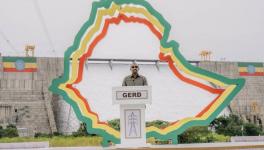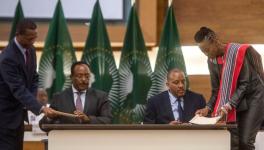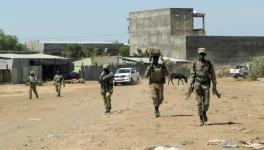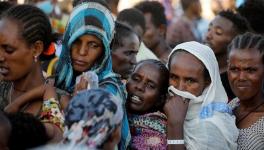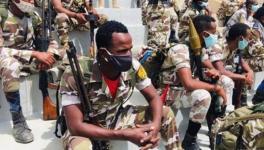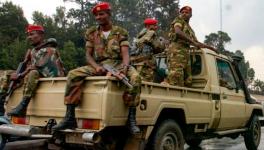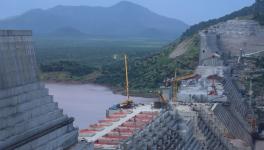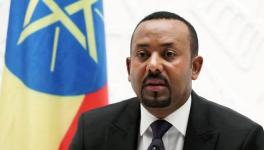Eritrea Acknowledges Presence of Troops in Ethiopia’s Tigray State, Commits to Withdrawal
Ethiopian refugees at a camp in Sudan. Photo: UNFPA/Sufian Abdul-Mouty
Eritrea’s UN Ambassador Sophia Tesfamariam committed to the withdrawal of its forces from the Ethiopian State of Tigray in a letter addressing the UN Security Council on Friday, April 16. This is the first public acknowledgement by Eritrea of the presence of its troops across the border in the war-torn State.
Having ended the decades-long conflict after signing a peace treaty with Ethiopia in 2018, Eritrea had sent its troops to fight alongside the Ethiopian federal forces in its war to wrest control of Tigray State from the Tigray People’s Liberation Front (TPLF).
The civil war broke out on November 4, 2020, after the Ethiopian Prime Minister Abiy Ahmed ordered the federal troops into Tigray to dislodge the TPLF from the State government after the latter attacked a federal military base.
The dominant force in the coalitions ruling Ethiopia since 1991, the TPLF became marginalized to a regional force in the border state of Tigray, when Abiy Ahmed rose to power as a reformist Prime Minister in 2018, in the backdrop of anti-government protests.
Soon after, Ahmed’s government signed the peace treaty with Eritrea, ending the decades conflict. The TPLF, which had been at the forefront of Ethiopia’s war with Eritrea between 1998 and 2000, had opposed the peace treaty.
The relations between Ethiopia’s federal government and the TPLF deteriorated over the years, and both parties had de-recognized each other last year before the civil war broke out on November 4.
Accusing Eritrea of supporting the Ethiopian federal troops in this war, the TPLF fired rockets targeting its capital city, Asmara, on November 14. The Eritrean government, on the other hand, blamed the TPLF for taking the conflict cross-border by firing the rockets.
By the end of the month, Tigray’s State capital city Mekelle had fallen to the federal troops, leaving behind a trail of civilian casualties and displacement. The troops were also supported by the Amharan militias, controlled by the State government of Tigray’s neighboring region, Amhara.
However, the TPLF, which had withdrawn its troops away from the cities, has since been involved in guerilla warfare. Clashes continue till date. All sides in the conflict – the Ethiopian troops, Eritrean troops, TPLF and the Amharan militias – have been accused of perpetrating human rights atrocities, including massacres, rapes and looting.
The UN estimates that by the end of last month, over 730,000 people from Tigray have been internally displaced in the conflict and over 62,000 have fled across the western border, seeking refuge in Sudan. 4.5 million of 6 million people in the region are estimated to be in need of humanitarian aid by the UN. The Ethiopian government’s estimate of the population in need of assistance in Tigray is much higher, at 91%.
Throughout these months of conflict, the Ethiopian government as well as the Eritrean government had denied the presence of Eritrean troops, despite the well-documented testimonies of various eye-witnesses, including residents, refugees and aid-workers.
On March 23, Ethiopian PM Abiy Ahmed acknowledged their presence and explained that Eritrean troops had “seized areas on the border” due to the “national security issues” which had emerged from the conflict in Tigray which shares the border with Eritrea. He reiterated Eritrea’s allegation that it had been drawn into the conflict by the TPLF’s firing of rockets, adding, however, that its troops had begun withdrawing.
Two weeks later, however, Mark Lowcock, the UN Under-Secretary-General for Humanitarian Affairs and Emergency Relief Coordinator, told a closed-door meeting of the UN Security Council (UNSC) on April 15: “Unfortunately, I must say that neither the U.N. nor any of the humanitarian agencies we work with have seen proof of Eritrean withdrawal.. We have, however, heard some reports of Eritrean soldiers now wearing Ethiopian Defense Force uniforms.”
Following this meeting, the US ambassador Linda Thomas-Greenfield insisted in a statement that the “Eritrean government must withdraw its forces from Ethiopia immediately.” Without committing to a deadline, Eritrea has told the UNSC that it will withdraw as and when the Ethiopian troops are deployed along the border.
In the letter posted on the website of Eritrea’s Information Ministry on April 16, Eritrea’s UN Ambassador Sophia Tesfamariam told the UNSC that “Eritrea and Ethiopia have agreed, at the highest levels, to embark on the withdrawal of Eritrean forces and the simultaneous redeployment of Ethiopian contingents along the international boundary.”
The UNSC is yet to come up with a joint statement on the conflict, as the permanent members have not been able to come to an agreement. While the US has been seeking to escalate the discussions at UNSC beyond the humanitarian concerns, Russia and China remain opposed due to the concerns that doing so might open the door for yet another Western intervention.
Courtesy: Peoples Dispatch
Get the latest reports & analysis with people's perspective on Protests, movements & deep analytical videos, discussions of the current affairs in your Telegram app. Subscribe to NewsClick's Telegram channel & get Real-Time updates on stories, as they get published on our website.









